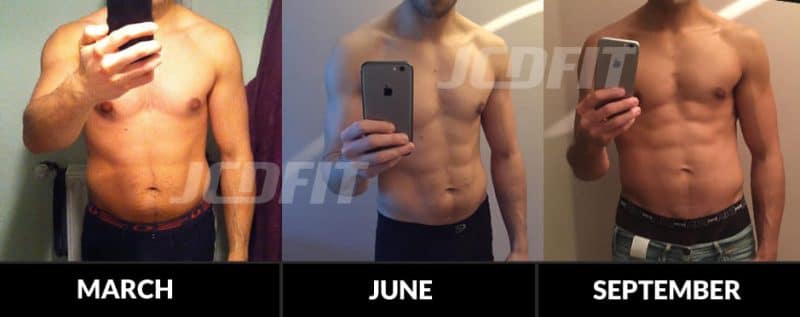
Fat loss successes and body transformations all have a story behind them.
For some, it seems to happen fairly linearly while for others it doesn’t.
Some people will scream at you — “fat loss is easy!” — insinuating that if you’re failing with your own fat loss efforts that you’re broken (which is highly unlikely), doing it all wrong (this is definitely possible), or just unlucky (but most likely inconsistent).
Creating and maintaining a caloric deficit is a fairly simple process, but most all of the following issues tend to crop up:
- maintaining strength and muscle
- combating metabolic slowdown
- balancing macro counting and a social life (as well as your psyche)
- managing your personal expectations
In this post, we’ll tackle each of the above, one by one, by outlining a client’s progress over the last year.
You Cut Calories To Lose Fat, Not Muscle
For many people, going on a diet can be disastrous — mostly from a standpoint of muscle loss, energy and mood swings and periods of yoyoing back and forth, losing and gaining the same 10 pounds over and over again.
If you ask the internet, many will tell you “diets don’t work’ but that should be said with better context in mind.
It should be stated as “crappy diets don’t work.”
If you follow most of the fad diets popular on the internet, then you’re doomed to fail.
One day carbs are the devil and responsible for keeping you fat, so you’re expected to cut out all fruit and starch and survive on nothing but leafy greens and lard.
The next day it’s because of all the supposed toxins in your gut, so you better go on that 5-day cayenne, lemon juice and water cleanse to kick start your fat loss.
And the next week, a study comes out that Paleo man lived to be 200, and therefore you should run around scavenging for raw meat and berries in your loincloth (totally kidding here, stay with me).
The truth is this — most everyone wants a shortcut. That’s why some of these diets are so popular and cleanses have been used in diet marketing for decades.
So with Salim, we had a specific plan: eat enough to support his training but also provide enough of a caloric deficit to produce slow and steady fat loss.
As far as his training, everything was centered around heavy compound lifts, with a good bit of metabolic training thrown in the mix.
So a typical day for him went as follows:
- Strength Movement 1 [heavy dropset training]
- Strength Movement 2 [moderately heavy dropset training]
- Metabolic Superset with opposing movements (ie: DB bench and seated rows)
- Metabolic Superset with differing movement planes (ie: Lat pulldowns and Arnold presses)
- Abs/shoulder health work
Training in this manner serves two primary purposes. The heavy loads send the ‘maintenance signal’ to his muscles and nervous system.
If you don’t push yourself in the gym, muscle loss can occur while dieting.
The metabolic work (ala supersets) burned some extra glycogen and provided some stimulus for muscle growth.
In addition to the training, we had to meet everything in the middle with a solid diet strategy.
Don’t Dig Yourself Into A Metabolic Wasteland
Dieting can be tough. You have a goal of attaining a certain look: having abs, veins popping out in places you wouldn’t imagine, and being beach ready.
However, if you diet too hard for too long, you will get run down.
Training performance suffers and you typically get some of the symptoms that come along with dieting, such as libido crash, hypometabolic symptoms (strong intolerance to cold, dry skin, low body temperature, and pulse, etc), and general lack of energy than normal.
To combat this, many will rely on stimulants for a boost in energy, whether it be coffee, caffeine pills, yohimbine, ephedrine, nicotine, or even stronger substances.
Others turn to increasing stress hormones via long periods of fasting, sometimes upwards of 24 hours to improve fat loss, and catecholamine release (stress hormones tend to supply a false sense of energy and alertness).
But the issue with this approach is just how far do you take it?
Anyway, we took a more sane approach. Not to say Salim didn’t enjoy coffee or sometimes skip breakfast, but we didn’t go to extreme measures to reduce hunger pangs.
So here’s exactly what we did…
Have Your Cake And Eat It Too
For the diet, we took an approach that is fairly well-known in the bodybuilding community, but not so much with lay exercise enthusiasts.
For many of my clients, but not all, I tend to cycle calories throughout the week, and give a pretty hefty carb refeed on Sundays (a full day off diet and training).
I first learned about this approach through Amir Siddiqui and then after reading more of Scott Abel’s work — particularly his book, The Cycle Diet.
So while I cannot take credit for the creation of such a protocol, I use it because it’s effective and offers a good deal of stress relief that dieting and training can create over time.
During the week, I’d have him alternating high and low days, which was typically a calorie flux around 200-300 calories per day and then typically increasing his intake on Sundays, in which I asked him to take the entire day off.
No training, no calorie restriction — a complete mental break from the woes of dieting and training.
He even had some travel plans in which he had to go off his macro-counting occasionally and rely on his eyeballing to stay within his calorie limits.
Since the macro tracking and monitoring of his diet was on-point, he had no issue with this when out.
He also enjoyed some food with company while harboring no negative feelings or worrying about fat gain. Here’s an image that proves my point:

The diet strategy is to create the fat loss environment during the week via diet and training, and then give the body and mind a big break from training and restrictive eating altogether.
Cheat meals, cheat days, refeeds, targeted calorie bombs, spikes — whatever you want to call them — all have their place within a diet program.
However, some people believe in and utilize them, while others do not.
And for those who never take a break from their diet, I feel they’re missing out on the psychological benefits, as well as some physiological ones, too.
One day of liberal eating, especially if your training is intense and coupled with a solid dietary deficit during the week, is not going to ruin your fat loss progress.
In fact, it might help you stay the course and consequently reach your goals.
To give you an idea of his intake, he’d consume around 400-600 kcals below maintenance during the week and then refeed on Sundays with about 2700+ calories and no scheduled activity.
This was very calculated and based on his activity levels, as well as his body weight. There were times when tracking wasn’t possible, and the liberal eating probably exceeded the totals above.
The End Result:
| Measurements | Starting Stats | Ending stats | Difference |
|---|---|---|---|
| Body weight | 172 | 156 | -16 pounds |
| 2” above navel | 32 inches | 28.5 inches | -3.5 inches |
| At navel | 32.5 inches | 29 inches | -3.5 inches |
| 2” below navel | 33.5 | 30 | -3.5 inches |

For some strength stats, Salim accomplished the following in this time span:
- Sumo Deadlift: 130kg x 6 → 145kg x 6.
- Maintained pressing strength for bench press and dumbbell variations.
- Maintained squat strength.
Managing Expectations By Focusing On The Process
In my personal coaching program, I stress that one should focus on The Process over the desired outcome over anything else.
Here’s a quick explanation as to why:
When we expect a certain outcome, it can produce a lot of unnecessary stress. And that stress does very little for helping you reach your goals of a leaner, more muscular physique.
In fact, it can be rather detrimental because stress tears down the body. And if you’re chronically stressing about an arbitrary deadline to reach a goal, you might be doing yourself a disservice.
With Salim, the focus was simple: Put in the work on a daily basis. Hit the training and diet with the most precision possible and let the results happen.
Of course, we tweaked the plan and macros over time, but that’s just how it goes.
Finally.. you should know he wasn’t in search of a quick-fix to be beach-ready, and that’s very important when you’re considering making, and maintaining long-term changes.
Here’s what Salim had to say about working through this process together:
“Before contacting JC I was bored with dieting, confused with all the information I had read during months. My weight lifting program was going nowhere and I was hitting plateaus on my main lifts (deadlifts, squats, bench).
I used to practice intermittent fasting with a high fat / low carb rest day, and a high carb / low fat training day. Then after having decided to move to the next level, I contacted JC with a specific goal in mind: getting ripped.
I knew it was going to take some time but I didn’t care and was willing to do what had to be done in order to succeed, which is very important in my opinion before ever considering to engage in such project.
JC advised a high carb based diet on both rest and training days (4 sessions per week). To be honest, I was doubtful with the high carb thing but I decided to trust him completely. It turns out it was a good decision since the results and fat loss were consistent and the most important thing being that with all that carbs, I had enough energy to perform in the gym week after week, a whole new thing for me since I was dieting and thought I would feel sore and like shit week after week.
All my questions were answered quickly and in the end, I learnt that focusing on details such as meal timing, or being too rigid with protocols such as intermittent fasting was useless.
All that matters is the total caloric intake, a high carb intake to sustain the training volume, enough protein for tissue repair and enough fat to keep hormonal dysfunctions at bay.
I have now everything I need to pursue my goals, which are to stay lean and eating enough to sustain my activities (boxing/lifting weights).
I’m really glad I found JC’s blog and hired him for advice on diet/training. I definitely recommend his services to anyone who wants to free himself/herself from bullshit, nonsense and meaningless details.”
If you want to make this year a success with your body composition goals, let’s get serious.
Want To Work Toward Similar Results?
Fill out the coaching application — it’s completely free. Then let’s have a chat about your goals, and what you’d like to accomplish in the next 6 months.
